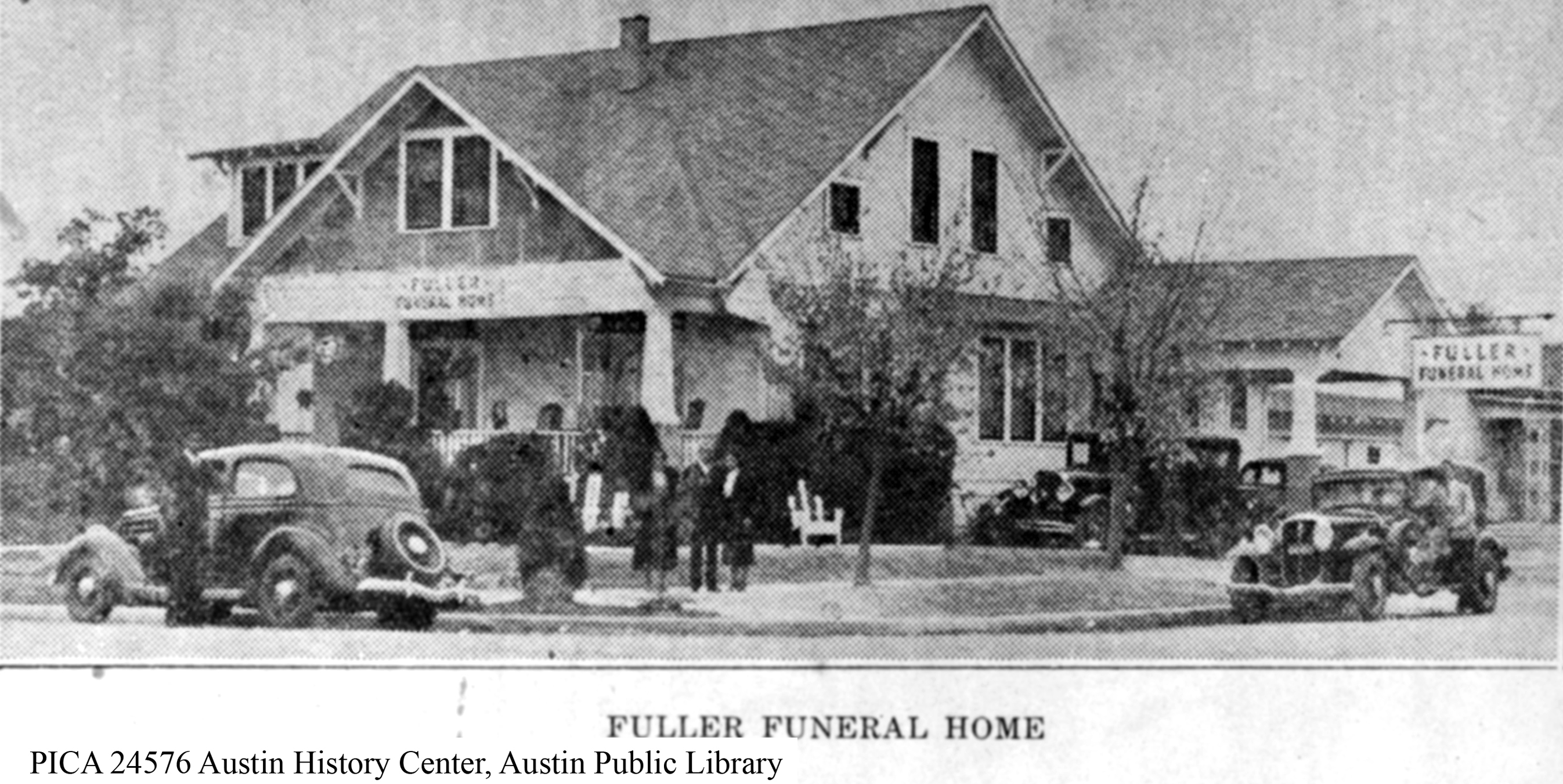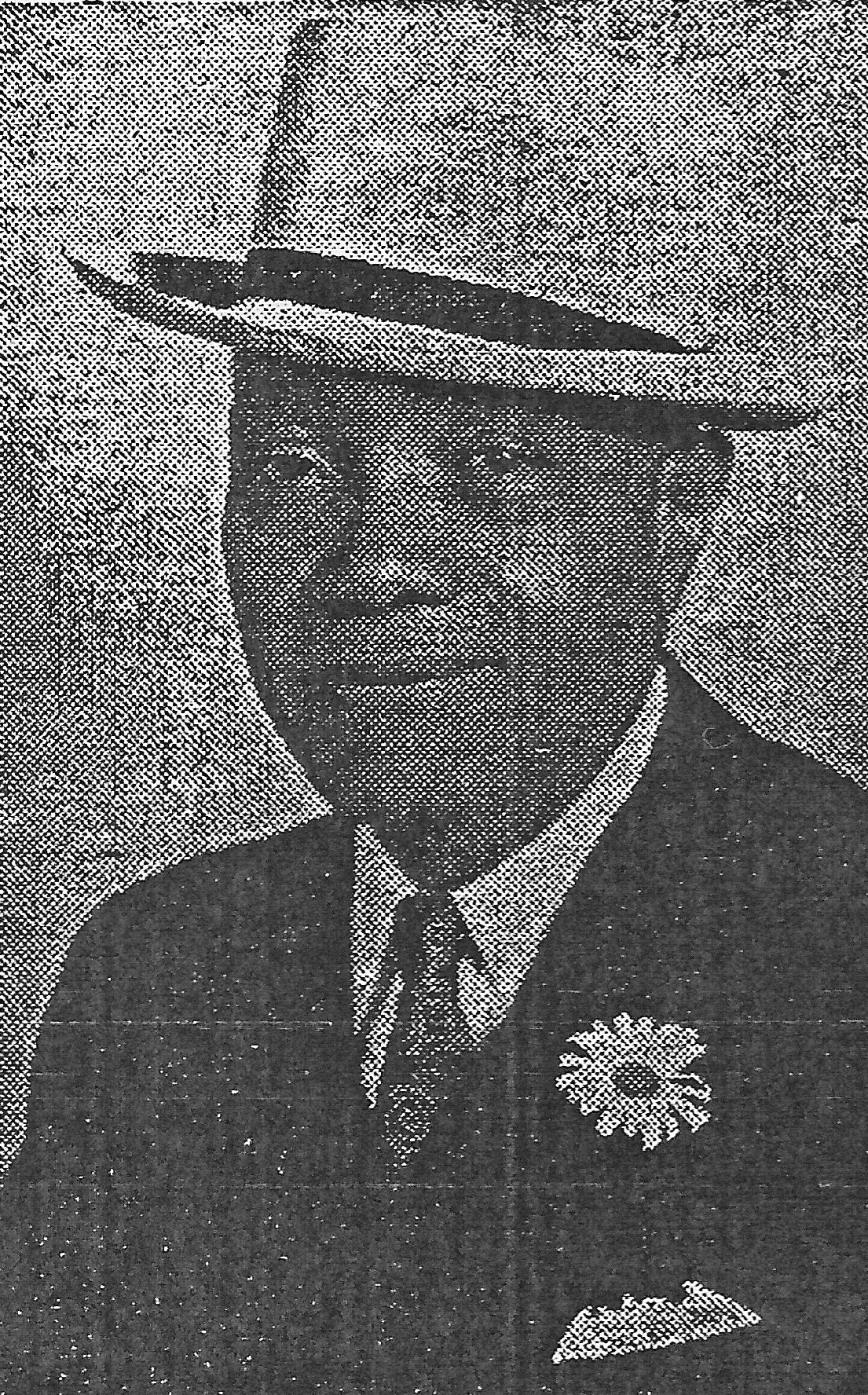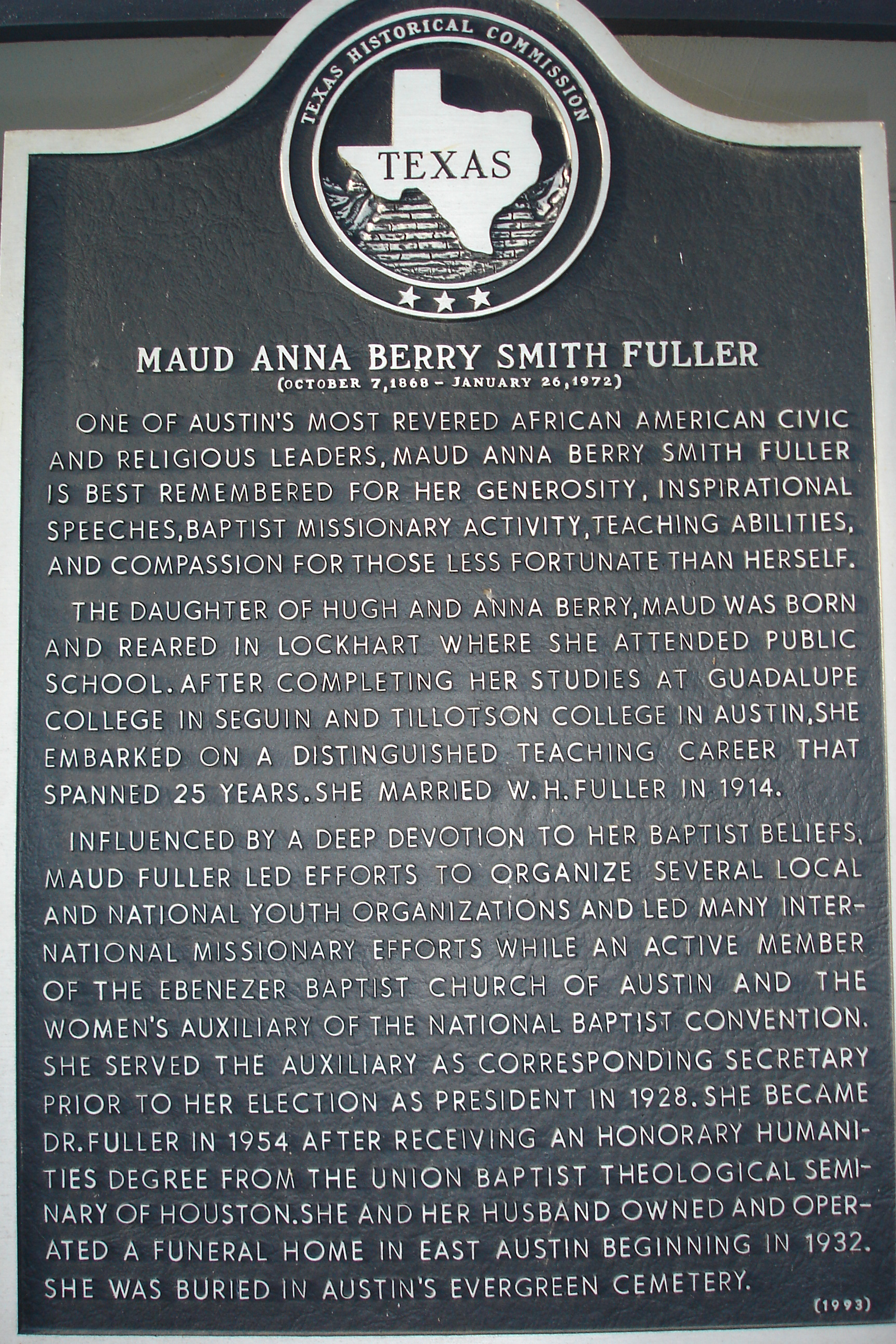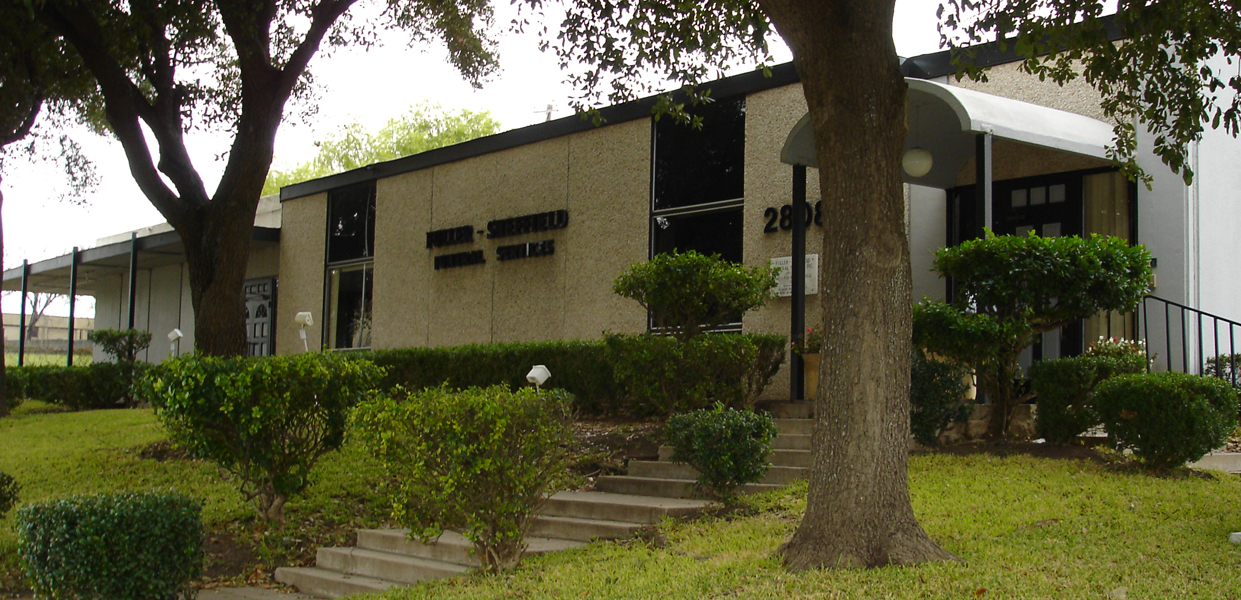
Fuller Funeral Home
| Timeline |
1911 Rhambo Funeral Parlor opens. Founded by N.W. Rhambo.
1932 or 36 William Handy Fuller and his wife, Maud A.B. Fuller, acquire the home after the death of N.W. Rhambo. Renamed Fuller Funeral Home.
1937 Fuller Funeral Home moves into a large frame house on Angelina Street, across the street from the Carver Library.
1941 W. H. Fuller dies and Miss. C.E.M. Mercer becomes a partner with Mrs. Fuller. Renamed Fuller-Mercer Funeral Home.
1953 Miss Mercer dies and Lloyd Sheffield becomes a partner with Mrs. Fuller. Renamed Fuller-Sheffield Funeral Service, Inc.
1970 Mr. Sheffield dies, leaving Mrs. Fuller the owner, assisted by Jesse Mercer.
1972 Mrs. Fuller dies, age 103.
1984 Fuller-Sheffield moves to its current location, on East 19th Street, now Martin Luther King, Jr., Boulevard
|
| The Fuller Funeral Home was the
legacy of an earlier African American mortuary owned by N. W. Rhambo. He
had been William M. Tears’ embalmer at the turn-of-the-century. In 1911 he
opened his own funeral home, on Neches Street, just off East Sixth Street.[1]
William Handy Fuller purchased the Rhambo Funeral Parlor from Rhambo’s widow
in 1932[2],
or 1936.[3]
|
 |
|
| The Fuller Funeral Home on Angelina Street, across from the Carver Library, circa 1938 | |
|
From a 1948 history of the mortuary:
“Mr. and Mrs. Fuller remodeled their sixteen room home on Angelina Street to which they moved their funeral parlor. The home is one of the most modernistic and beautiful homes in the Southwest.
“Some of the features of this home are: separate repose rooms furnished like modern bedrooms for men, women and children; a beautiful display room, spacious chapel... and a portable organ for use at the cemetery.
“The yard is beautifully landscaped including: a roving carpet of grass and a well-situated fish pond, colorful flowers, well trimmed shrubbery, attractive palms and refreshing shade trees.”[4] |
 |
| From the collection of Marjon Christopher, King-Tears, date unknown. |
|
William Handy Fuller (1874-1941) and his wife, Maud Anna Berry Smith Fuller (1868-1972), were leaders of the African American community in Austin.
Mr. Fuller was born in Alabama. When asked about his education, he often replied that he attended the “Swamp University” in the piney woods of South Alabama, and did graduate work at the “University of Hard Knocks;” however, he actually completed public school and took correspondence courses from colleges in Pennsylvania and Ohio. Before moving to Texas, he was the editor-in-chief of the Coffeyville American in Kansas. [5]
|
 |
The following are quotes from articles about Mr. Fuller from the 1940s: “Mr. Fuller was married to Mrs. M.A.B. Smith in 1914. They had much of common interest and thought, combined their efforts in the promotion of religious, civic and charitable organizations, and contributed freely to their financial support.”[6] “He purchased the funeral parlor of the late N.W. Rhambo and has built one of the most beautiful homes in the southwest. He organized the Mutual Aid Association, under the supervision of the Texas Insurance Commission, in 1935, and has given employment to a number of men and women. He was the first undertaker in Austin to join hands with the minister to cut out Sunday funerals. He also urges his employees to attend some church each Sunday.”[7] “There is no religious, civic or political movement for the welfare of the Negroes in the city of Austin that did not feel the influence of the leadership of this fine man. He took the lead in all activities; he was always able to obtain from influential members of the White race the things that were most beneficial to the advancement of his race. He possessed unusual ability and business integrity, he could state the case of his people more positively and convincingly and yet in a manner that would please the most rabid man and leave him with a smile on his face. He was the only man in our group who was able to contact people in the ranks of White Baptists and raise large sums of money for our group.”[8] |
| Fuller-Sheffield memorial program | |
|
Mrs. Fuller was an important leader in East Austin, as well. She lived to be 103.
The following are excerpts from the text of the Texas Historical Commission marker dedicated in 1993 to her. It is located in front of the current Fuller-Sheffield Funeral Home on MLK Boulevard:
“One of Austin’s most revered African-American civic and religious leaders, Maud Anna Berry Smith Fuller is best remembered for her generosity, inspirational speeches, Baptist missionary activity, teaching abilities, and compassion for those less fortunate than herself.
“The daughter of Hugh and Anna Berry, Maud was born and reared in Lockhart, Texas, where she attended public school. After completing her studies at Guadalupe College in Seguin and Tillotson College in Austin, Texas, she embarked on a distinguished teaching career that spanned 25 years. She married W.H. Fuller in 1914.
“Influenced by a deep devotion to her Baptist beliefs, Maud Fuller led efforts to organize several local and national youth organizations, and led many international missionary efforts while an active member of Ebenezer Baptist Church, Austin, Texas, and the Women’s Auxiliary of the National Baptist Convention. She served on the auxiliary board as Correspondent Secretary prior to her election as President in 1928. She became Dr. Fuller in 1954 after receiving an honorary humanitarian degree from the Union Baptist Theological Seminary of Houston, Texas.”[9] |
 |
|
|
|
Fuller-Sheffield memorial program
|
 |
Historical Marker in front of
the current Fuller-Sheffield Funeral Services on Martin Luther King, Jr.,
Boulevard (Photo by author)
|
|
|
| The current Fuller-Sheffield Funeral Services on Martin Luther King, Jr., Boulevard |
 |
|
| Photo by author |
Home Historical Context Tears History Fuller History Black Cemeteries
[1] King, J.T.Q. (1995+?). The History of King-Tears Mortuary, Inc. [From the personal papers of Marjon Christopher, V.P., King-Tears.]
[2] Ibid.
[3] Fuller-Sheffield Funeral Service, Inc. (2000). Celebrating eighty-four years of service. [Memorial program]Austin: [The mortuary]; [From the Austin History Center “Undertakers & Undertaking” file].
[4] Fuller, M.A.B. (1948). Historical booklet of religious, business, professional men and women. [Austin: S.n.] [From the Austin History Center “Undertakers & Undertaking” file].
[5] Brewer, J. M., ed. (1940). Mr. W. H. Fuller. In An historical outline of the Negro in Travis County. [Austin]: Samuel Huston College.
[6] Ibid.
[7] Ibid.
[8] Martin, J.D. (1941). In memorium W. H. Fuller. [Austin: S.n.] [Funeral program, from the W.H. Fuller file at the Austin History Center.]
[9] Texas Historical Commission. (1993). Maud Anna Berry Smith Fuller [historical marker]. Austin: [The Commission.]